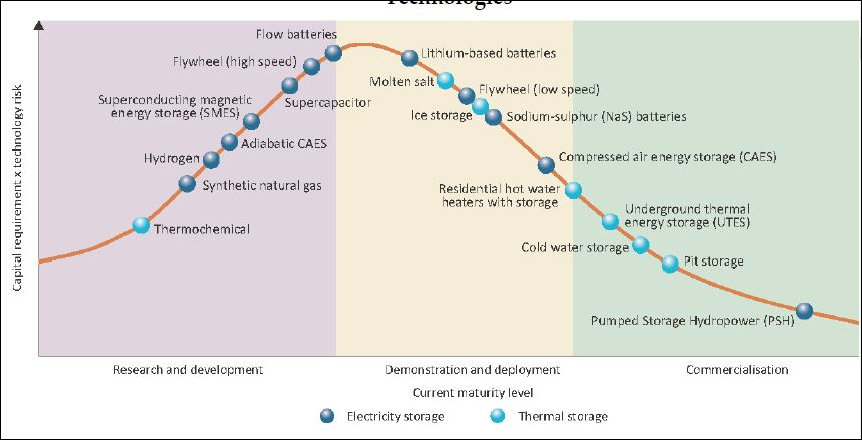
“Technology Risks and Maturity Level of Energy Storage Technologies.” Graphic credit: Dominion 2017 Integrated Resource Plan.
A proposed pumped hydroelectric storage power station in Southwest Virginia would bring more than $576 million in economic benefits to the Commonwealth, including $320 million in economic impact for Southwest Virginia, according to a study prepared by Richmond-based Chmura Economics & Analytics and commissioned by Dominion Energy.
The hydroelectric project, proposed by Dominion Energy, would support 3,000 Virginia jobs during development and construction, including 2,000 in the coalfield region. Once in operation, the facility would produce about $37 million annually in economic impact for Southwest Virginia including $12 million annually in tax revenues for local governments in Southwest Virginia, states Dominion in a press release.
“We are very excited about the prospect of bringing another major capital investment to the coalfield region of Southwest Virginia,” said Mark Mitchell, vice president of generation construction. (Dominion already operates a hybrid coal-biomass generating plant in Wise County.) “The entire grid system will benefit from having this new generation once it comes online, and the local area will benefit from the jobs and economic benefits that will come from it.”
The Dominion press release did not address the potential impact of the pumped-storage project on Virginia rate payers. While the facility would entail a hefty up-front capital cost, it could generate electricity during periods of peak demand or, potentially, offset fluctuations in output by Dominion’s increasing fleet of utility-scale solar farms. In its 2017 Integrated Resource Plan, Dominion describes pumped storage as the most mature and economically feasible form of energy storage, adding that the “proven dispatchable technology … would complement the ongoing development of renewable solar and wind resources.”
While Dominion operates the nation’s largest pumped storage dam in Bath County, it had not indicated much interest in second major facility until this year when the General Assembly enacted a bill that encourages a Virginia utility to build a pumped-storage facility in the coalfields. The law would allow the utility to petition the State Corporation Commission to recover project costs as they are incurred rather than waiting until the project is complete. Legislators made no secret of the fact that they saw the project as a boon for the economically depressed coalfield region, and some speculated that the pumped-storage facility might be accompanied by extensive local investment in solar power.
A pumped storage facility uses gravity-fed water from an upper-level basin to a lower-level basin to power the generators during periods of peak demand, when electricity is most expensive, and uses electric power to pump the water back to the upper basin when electricity is cheap.
After examining more than 150 potential sites in far Southwest Virginia for suitable geology and topography, availability of water, proximity to electric transmission lines, impact on landowners and other factors, Dominion has selected a site in Tazewell County “for further study.” Should its in-depth, on-the-ground studies show the site to be not suitable, it has identified other candidate locations for the facility.
Another option, touted by coalfield legislators, was to use a mine cavity as a lower reservoir. Dominion has engaged Dr. Michael Karmis at Virginia Tech to evaluate the idea. “Based on information provided to Dominion Energy Virginia,” says the Dominion website, “the former Bullitt mine near the town of Appalachia was identified as a top site for evaluation and will be evaluated in the Virginia Tech study.”
The company website says that the project is “in its very early stages and the project’s final size and scope have not yet been determined.” After scrapping with landowners along the route of the proposed Atlantic Coast Pipeline, of which it is the managing partner, Dominion is “sensitive to the needs and concerns” of homeowners who might be impacted by a pumped storage facility, the website says. The company “will make every effort to keep them informed and work with them throughout the process.”
Bacon’s bottom line: While Dominion is careful to say that it has not committed to a pumped-storage project, the fact that it has commissioned a positive economic impact report suggests that it is laying the political/PR groundwork for one. Could this be a harbinger of a greater commitment by Dominion to solar and wind power in the future? Or does Dominion plan to sell electricity into wholesale markets to for purchase by other utilities with big plans for renewables? That’s another economic analysis I’d like to see.


